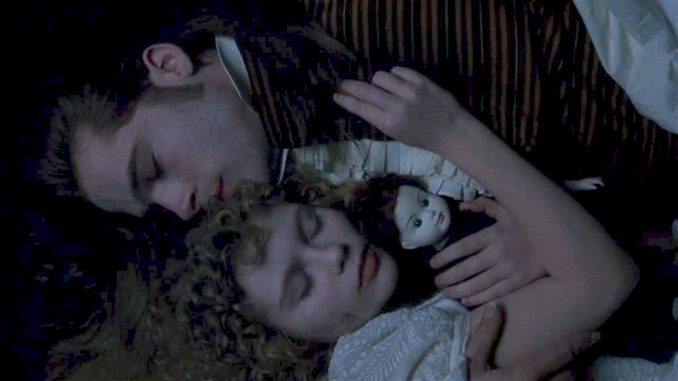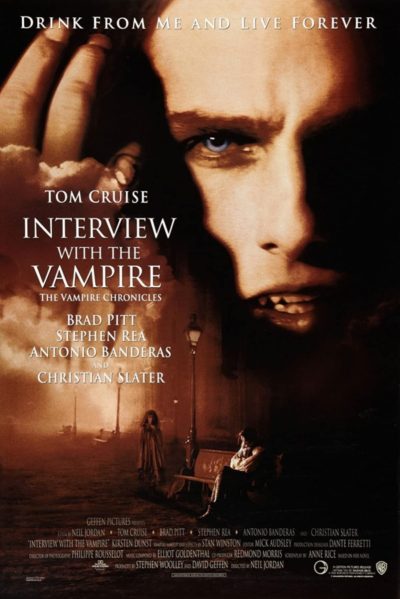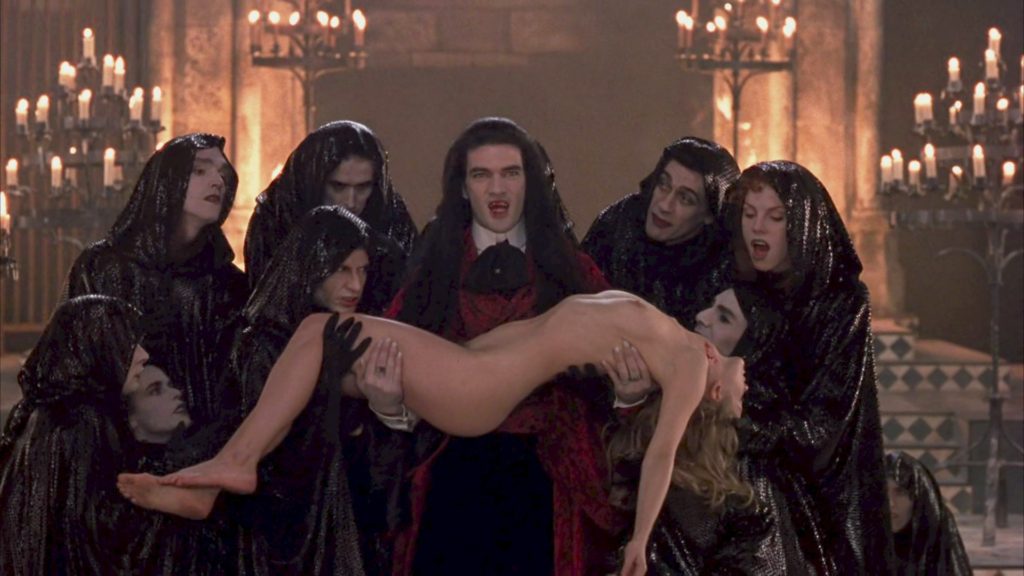
Rating: C
Director: Neil Jordan
Star: Brad Pitt, Tom Cruise, Kirsten Dunst, Christian Slater
I kinda think this film perhaps got made 10-15 years too soon. Both Pitt and Cruise are relatively early in their careers, and are still coming to terms with that whole “acting” thing. Right now, they appear to be confusing it with “standing around, looking pretty”. To their credit, they have worked tirelessly on the craft, and now are both very solid actors. But at this stage… Well, let’s just say, there are points where their scenes together here, feel more like the model-off from Zoolander. Still, could have been worse. At one point Anne Rice, worried about the gay subtext, flipped Louis to a woman. Cher was considered for the role. Yeah… I think I’ll take the version with the gays in it, thanks. Though in comparison to the AMC series, this might as well be driving a pick-up truck and listening to Kid Rock.
I do feel this has a lot to answer for, as Rice literally wrote the book on whiny pretty-boy vampires, a concept subsequently beaten like a deceased equine by Twilight. Sure, vampires had been attractive enough before. However, they very much tended to be the villains of the piece, more or less feral monsters, concealed beneath a thin veneer of civility. This is instead a vampire soap-opera, with Dark Shadows a closer relation than the movies of Bela Lugosi or Christopher Lee. The core is how Louis (Pitt) staggers from one toxic relationship to another. These begin with Lestat (Cruise), the vampire who turns him in 1791, as Louis is in a self-destructive downward spiral of self-harm. The red flags here are obvious: “don’t put your dick in crazy” is clearly advice that applies, regardless of sexuality or immortality.
 The two are psychologically incompatible from beginning, having radically different opinions about how vampires should operate. Lestat is an unashamed predator, revelling in the taking of life, while Louis would rather exist on animal blood, the vampire equivalent of 7-11 taquitos. Obvious and logical reaction: “Well, it’s been great. We should see other people. It’s not you, it’s me.” Nah. Instead they stay together for decades, mostly through Lestat’s textbook abusive behaviour. [Thandie Newton, who’d play opposite Cruise six years later in Mission: Impossible 2, turns up as a plantation slave] To fix this crippled relationship, they end up attempting to become a family, with the addition of Claudia (Dunst), a 10-year-old turned into a vampire by Lestat, as a gift for Louis. What was wrong with a puppy?
The two are psychologically incompatible from beginning, having radically different opinions about how vampires should operate. Lestat is an unashamed predator, revelling in the taking of life, while Louis would rather exist on animal blood, the vampire equivalent of 7-11 taquitos. Obvious and logical reaction: “Well, it’s been great. We should see other people. It’s not you, it’s me.” Nah. Instead they stay together for decades, mostly through Lestat’s textbook abusive behaviour. [Thandie Newton, who’d play opposite Cruise six years later in Mission: Impossible 2, turns up as a plantation slave] To fix this crippled relationship, they end up attempting to become a family, with the addition of Claudia (Dunst), a 10-year-old turned into a vampire by Lestat, as a gift for Louis. What was wrong with a puppy?
Let’s discuss the pedo subtext here, which might be even less subtle than the gay one. For Claudia stays 10 forever, physically, even though she ages emotionally, embarking on a relationship with Louis. The ick factor isn’t helped by make-up and costume choices which sometimes makes her look like a character from Toddlers and Tiaras. Mind you, she’s not happy about it. There are good reasons the vampire community, we later discover, forbid turning someone so young. Less clear is their position on fucking ten-year-olds and the “I thought she was forty, m’lud” defense. I guess we should be grateful this wasn’t faithfully adapted from the book, where Claudia is aged five…
Anyway, Claudia turns out to be just as toxic as Lestat. Though since her two Daddies basically keep treating her like their dress-up doll, I can’t blame her. Fed up with the way she is treated, she leaves. Sorry, my mistake: she drugs Lestat, slits his throat and dumps him in a swamp, with Louis’s help. Um, if you want to dispose of him permanently, why not just expose him to sunlight? Things get set on fire. This happens with surprising frequency and ease in this film. The nineteenth century appears to have been remarkably flammable. Claudia and Louis head off to Europe looking for other vampires, and find another manipulative bastard in Armand (Antonio Banderas); I’m detecting a theme here. The vampire community is not happy about the whole ‘murdering Lestat” thing, and let’s just say, another Louis relationship meets an unhappy end.
 I can’t deny this looks as good as its two stars, resources being not an issue. With a budget of $60 million, about double that in 2023 dollars, it was the most expensive vampire movie made to that point. [Depending on your criteria, Van Helsing at $160 million might be the current record holder] It certainly does the century and continent spanning script justice. I think it works best once it leaves Lestat and Louis’s domestic bickering behind, and expands out into a bigger world, where you can appreciate the scale. There’s a whole film to be made out of the Théâtre des Vampires (above), which is like a bloodsucking version of Grand Guignol. Their play – with the only bit of nudity in the movie – is all the more ghastly because we know, and the audience doesn’t (or perhaps doesn’t care?), that the victim begging for her life, is genuinely begging for her life.
I can’t deny this looks as good as its two stars, resources being not an issue. With a budget of $60 million, about double that in 2023 dollars, it was the most expensive vampire movie made to that point. [Depending on your criteria, Van Helsing at $160 million might be the current record holder] It certainly does the century and continent spanning script justice. I think it works best once it leaves Lestat and Louis’s domestic bickering behind, and expands out into a bigger world, where you can appreciate the scale. There’s a whole film to be made out of the Théâtre des Vampires (above), which is like a bloodsucking version of Grand Guignol. Their play – with the only bit of nudity in the movie – is all the more ghastly because we know, and the audience doesn’t (or perhaps doesn’t care?), that the victim begging for her life, is genuinely begging for her life.
Admittedly, it’s difficult to take this kind of thing too seriously, in a post-What We Do in the Shadows world. The tropes that may have been fresh when the film came out are now little more than clichés. I found myself illogically annoyed by the script’s fondness for hopping vast slews of time with a casual line, e.g. “For years I wandered…” I’d prefer to have seen what Louis got up to, say in World War II, than further scenes of him moping about. It kinda gives the lie to the second (largely forgotten) part of the title. Can you really call yourself a chronicle, when the approach is, “Then the 20th century happened” That whirring sound, is a medieval monk, spinning in his grave. It’s a weakness the TV series was able to address, taking a more leisurely approach to the passage of time. But in general, this feels more influential than entertaining. And being responsible for Twilight means Anne’s got some explaining to do.
This review is part of our October 2023 feature, 31 Days of Vampires.
